Video Game Sound Tests
- Matthew McCarthy

- Sep 6, 2021
- 8 min read
The perfect option for experimenting if video game music is actually a decrypted message from the seahorses.
My results haven't been favourable. However, my knowledge of Video Game Sound Tests are.
What Are Sound Tests?
A Video Game Sound Test is a menu you access to listen to the music, sound effects, and/or voice clips available in a game. These menus usually have no background noises, so you can enjoy the sounds/music of the game in peace. Sound Tests take different names like Sound Check, Sound Mode, etc., however they all have the same function.
Credit: Luigi-San ("Space Harrier" and "Madden NFL '97") and Rightman ("Contra")
Most Sound Tests loop the music repeatedly for all eternity, making it perfect for funerals if a sad song is in the Sound Test. However, some Sound Tests can have playlists for songs (very rare) and only play the song once/with one loop.
That's the basic gist of Sound Tests. They're pretty neat to have since you can listen to the music of a game and also find the names of tracks you love. Sound Tests in general are hard to do poorly, I'm only aware of two bad ones.
There's the Japanese Revision of "Ghosts'n Goblins" for the Arcade. The Sound Test would only be played once per button press, and the music would never stop. This was fixed in later revisions though.
"Corpse Party Blood Covered: ...Repeated Fear" is the other one, at least the 3DS version. The Sound Test is separated into four interactable cabinets with no song titles and there's no way to go back to a previous song unless you start from the beginning of the cabinet's song list. I get this is a horror game, but this is way too scary.

These are both solid games, but their Sound Tests leave a lot to be desired.
However, why do Sound Tests exist in the first place? Originally, they were only made to test the music so it worked properly in arcade games. The Sound Test was accessed through a testing page by the arcade game's game board.
Sound Tests were featured in home console versions of games too, but were made accessible to players, likely as a bonus. Keep in mind this was before video game soundtracks were available, at least internationally, so for most games back in the day, this was the only way to listen to their music.
The earliest examples of Sound Tests I could find were for "Tapper" and "Grasspin" in 1983 in the arcade. For accessible Sound Tests, there were "Gulkave" for the MSX and "Zanac EX" for the MSX2, both released in 1986.
If you've never heard of them, don't worry, neither have I before writing this article. They were either not released outside of Japan or have mostly been forgotten.
There are multiple Sound Test types, these aren't all of them, but they're the most common ones:
Unlockable Sound Tests
Unlockable Sound Tests are, as the name suggests, unlockable after meeting specific requirements. These can range from beating challenges, 100 per centing a game, or beating the game.
These tend to be stables for franchises that use them, such as with the "Kirby" series.
Semi-Unlockable Sound Tests
Semi-Unlockable Sound Tests are unlocked from or near the beginning, but instead of unlocking the Sound Test, you unlock the songs/sounds in the Sound Test.
Sometimes you just need to get to where the song is played to unlock it like in "Super Pokémon Mystery Dungeon." Other times you need to find them in levels/buy them, such as in "Sonic Unleashed."
Credit for "Sonic Unleashed" picture: Cyberman65
Arguably the most popular example of this is in "Super Smash Bros. Brawl" where songs are unlocked by collecting CDs.
Mixed Sound Tests
Mixed Sound Tests can vary. These can apply to Sound Tests that have to be unlocked with the music tracks for it also needing to be unlocked, like in “Kirby & the Amazing Mirror” and "Kirby: Squeak Squad."
Credit for both pictures: Tediousaurus Rex
Another example is from "Fire Emblem Echoes: Shadows of Valentia." The Sound Test is unlocked by beating the game, but can be accessed early by pressing Up, Down, Left, Right, Up on the title screen.
This makes "Echoes" Sound Test both an Unlockable Sound Test and one of the...
Hidden Sound Tests
I am so good with transitions.
Hidden Sound Tests were the most common, especially back in Nintendo's early days in the console market. Players access these Sound Tests with a password or button combination.
With passwords, my favourite example is from “Castlevania: Belmont’s Revenge” where the Sound Test is accessed by putting a password with all hearts. It's one of the better ones since it's hidden, but also plausible to find.
Sometimes passwords are more... Complicated. Such as with Japanese-Exclusive “Hiryuu no Ken III: Gonin no Dragon.” By entering おときくfollowed by a space and then a number (ex. 01), you can listen to said track. おときくmeans “listen to sound” in Japanese, oops, made you learn something.
For button combinations, "Donkey Kong Country" has a Sound Test using a button combination for both the SNES original and GBA port. However, I don't have the SNES version so I'm going to show the GBA version.
By holding down Select and pressing B, A, L, L, A, Down on the file select screen in the GBA version, you’d unlock the Sound Test.
However, some developers went too far with the button combinations. For example, the Sound Test for “Legacy of the Wizard” is unlocked by pressing Down + Select + Right on the first controller while pressing and holding Up + B + A + Right on the second controller.
Granted, this is just me trying the button combination without owning the game, but I swear this is physically impossible with one person. Sure it's easier with a second person, but what if that isn't an option? Even then, having to ask someone for help to access a Sound Test is just overkill.
This isn't even the only instance of this, multiple games like “Quartet” on the Sega Master System and “Zero Divide” on the PlayStation did this. Thankfully, this seems to have mostly died out by the SNES and Sega Genesis days. Although, Hidden Sound Tests would stay around on systems like the Nintendo 64 and even Plug and Play systems.
Credits: Luigi-San (Star Wars: Rogue Squadron (N64)) and Tikal. (Scooby-Doo! and the Mystery of the Castle).
Although... To be honest, if I were a developer, I'd make the Sound Test hidden too. It makes them more rewarding to find and I imagine it's fun to program.
Overall, there are 1,700+ game with Hidden Sound Tests according to The Cutting Floor, which holy h*ck, that's a lot. There's a part of me that actually misses them... Also another part that misses Sound Tests in general...
...Wait.
Obsoletion
I swear that's a word...
While Sound Tests aren't completely gone, as they still show up in games, prominently Nintendo games, they were fading out by the Sixth-Generation of consoles, and extinct by the Seventh-Generation.
There were still games with Sound Tests on those consoles like “Scott Pilgrim Vs. the World” and “Sonic Unleashed," but they were becoming rare.
Now I haven't played every Seventh-Generation game, but with the 100+ Xbox 360 games I've played, why can I only think of two games? And one of them I've never even played!
However, there is a possible explanation... Back in the previous generations, the only way to hear a game's soundtrack was through the games themselves. Video Game music only started to get more recognized in the Fifth-Generation where it became grander, rivaling movie soundtracks.
Sound Tests were no longer the only way to listen to video game music officially, as video game soundtracks were being distributed by the fifth-generation. From both a business and consumer point-of-view, it makes sense.
The composers get more money/royalties for their work while consumers get a convenient way to listen to their favourite soundtracks. It's far quicker to listen to the soundtrack from a CD or on your phone with iTunes, Bandcamp, Spotify, etc. than booting up a game for its Sound Test.
Also, you can’t take a Wii with you to work so you can listen to a Sound Test, you can try, but good god why would you?
Plenty of video game soundtracks are available on digital platforms, like from SEGA’s, Capcom’s, and Falcom’s IPs. In my opinion, it beats listening to a Sound Test.
Some composers/developers even offer their music on vinyl.
It’s not just limited to indie titles, even big titles like "Nier Gestalt & Replicant" have vinyl albums. Although... I can see the appeal.

Vinyl records and covers look amazing. With the way Vinyls work, they provide an experience modern music players can't capture.
Despite the title, this video explains the appeal of Vinyl well.
This all shows that video game soundtracks being sold are now more commonplace today then back then. Sound Tests are no longer a necessary element. Even for games that didn't distribute their music, ripping the music/music files is always an option.
However, not all composers and developers distribute their music. Sometimes they simply choose not to release the music, like with licensed games. In the case of Nintendo, they release physical soundtracks but only in Japan which cost...
...Hundreds, no seriously, I looked. I'd genuinely kill for some Nintendo soundtracks, but filing for bankruptcy ain't one of my hobbies. Weirdly, there are digital soundtracks for most of the "Pokémon" soundtracks and a “Super Mario Odyssey” Sound Selection, but those are the only ones available digitally.
However, Nintendo is infamous for not distributing their music conveniently due to their antics of taking down music they own on YouTube. Sure they have the legal right to do that, much like how I have the legal right to make a meme that was relevant in 2016 in 2021, that doesn't mean I should actually do it though.
While things aren't perfect, advancements in technology have made Sound Tests obsolete, in return for making video game music more easily distributed and purchasable.
Sound Tests Today
Today, Sound Tests just can't compare to video game soundtracks. While Nintendo still includes Sound Tests in their games like “Super Smash Bros.,” “Fire Emblem,” “Kirby,” etc., it comes off more as obligation to include it since the rest/most of the games in said franchises have them.
Credits: Nova Stopmonk (Super Smash Bros. for Wii U), Luke (Fire Emblem: Three Houses), and NerdyBoutKirby [Kirby and the Rainbow Curse]
Which isn't a bad thing by any means, I'm glad they're included, but it's just an observation I can't help but notice.
Nintendo isn't the only company still doing video game Sound Tests, "Crash Team Racing: Nitro Fueled" has a Sound Test, alongside the "Mega Man Zero/ZX Legacy Collection."
And... Uh... ...That's all I could find for non-Nintendo games with Sound Tests, yeah they're... Extremely rare nowadays, or at least not as documented.
The Bottom Line
Sound Tests are mostly obsolete given video game soundtracks are more readably available on YouTube and digital music platforms today. I say mostly obsolete for a reason though.
With soundtracks as large as the “Super Smash Bros.” games with so many different songs from different franchises, a Sound Test is necessary to list their composers, titles, game source, and etc..

Sometimes in cases like “Hatsune Miku: Project Mirai DX” for the 3DS, the Sound Test allows your choice(s) of music to be played while playing the game normally. It adds a good layer of customization to keep the soundtrack refreshing.
While Sound Tests are mostly obsolete, they also aren’t useless/pointless to have in games. I would argue that games like “Hatsune Miku: Project Mirai DX” show potential for Sound Tests to be more like a Music Player you can listen to while playing the game normally.
Imagine playing a JRPG and exploring a peaceful forest while listening to a town theme or the boss theme, it'd unironically be amazing. However, with the way most Sound Tests are, they just don’t have a place in most video games today unfortunately. Unless Sound Tests evolve, they'll stay that way.

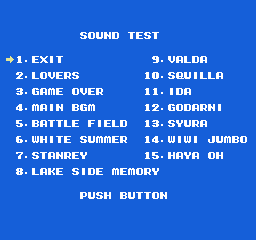
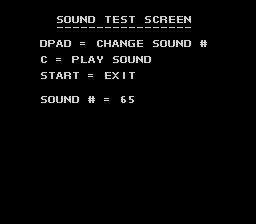
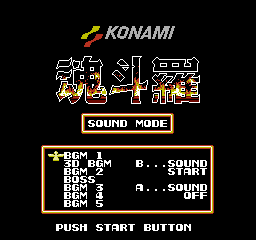


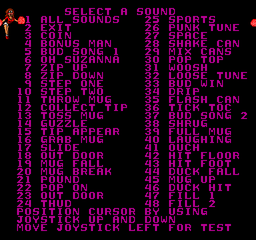
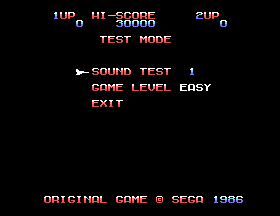

















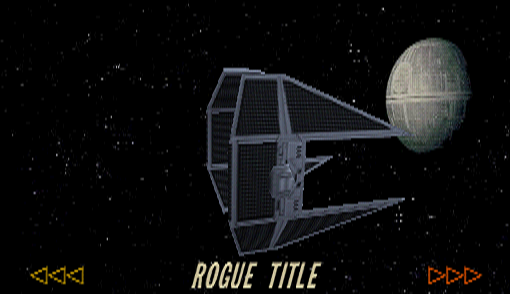
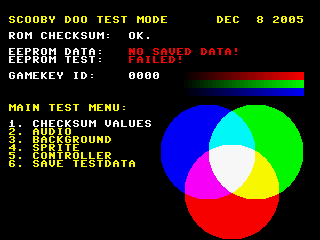




























Comments